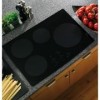GE PHP900DMBB Use and Care Manual - Page 9
Safety Instructions, Care and Cleaning, Troubleshooting Tips, Consumer Support, Operating Instructions - lowes
 |
UPC - 084691163671
View all GE PHP900DMBB manuals
Add to My Manuals
Save this manual to your list of manuals |
Page 9 highlights
Safety Instructions Operating Instructions Care and Cleaning Troubleshooting Tips Consumer Support Use flat-bottomed pans. Use a griddle. Use a flat-bottomed wok. ge.com Suitable Cookware Use quality cookware with heavier bottoms for better heat distribution and even cooking results. Choose cookware made of magnetic stainless steel, enamel coated cast iron, enameled steel and combinations of these materials. Some cookware is specifically identified by the manufacturer for use with induction cooktops. Use a magnet to test if the cookware will work. Flat-bottomed pans give best results. Pans with rims or slight ridges can be used. Round pans give best results. Pans with warped or curved bottoms will not heat evenly. For wok cooking, use a flat-bottomed wok. Do not use a wok with a support ring. Cookware "noise" Slight sounds may be produced by different types of cookware. Heavier pans such as enameled cast iron produce less noise than a lighter weight multi-ply stainless steel pan. The size of the pan, and the amount of contents, can also contribute to the sound level. When using adjacent elements that are set at certain power level settings, magnetic fields may interact and produce a low whistle or intermitted "hum". These noises can be reduced or eliminated by lowering or raising the power level settings of one or both of the elements. Pans that completely cover the element ring will produce less noise. A low "humming" noise is normal particularly on high settings. Do not place wet pans on the glass cooktop. Do not use woks with support rings on the glass cooktop. For Best Results s Do not place wet pans or lids on the cooking surface or induction rings. s Do not place wet fingers on the glass cooktop. Wipe up spills on the controls with dry hands. s Do not use woks with support rings. This type of wok will not heat on an induction element. s Use only a flat-bottomed wok, available from many cookware manufacturers. The bottom of the wok should match the diameter of the induction ring to insure proper contact. s Some special cooking procedures require specific cookware such as pressure cookers, deep-fat fryers, etc. Cookware with flat bottoms that match the size of the surface element being used will produce the best results. Use flat-bottomed woks on the glass cooktop. 9















